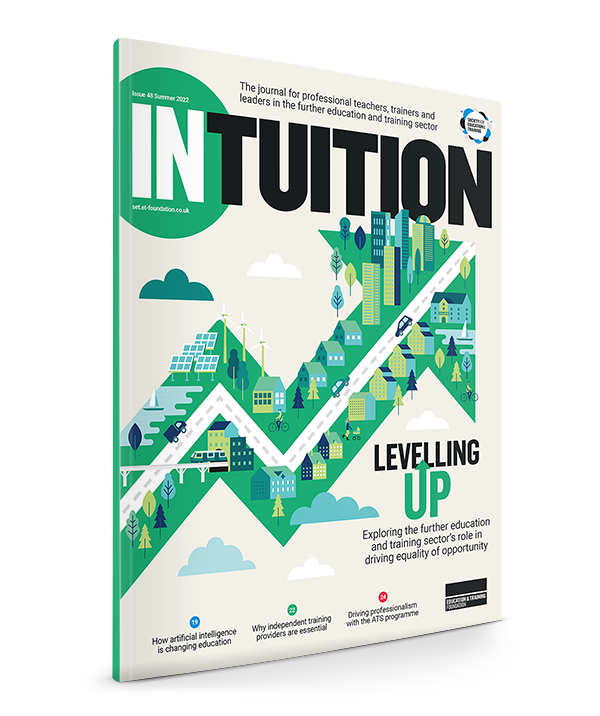inTuition taster: Keep the cogs turning
Systems thinking offers a fresh approach to navigating a constantly changing landscape, and is a vital part of the drive to ensure FE and Skills acts as a ‘self-improving system’. Lou Mycroft outlines her own journey from cynic to advocate.

Have you ever heard of ‘joy loops’? How about ‘doom loops’? These may not be familiar concepts, but I promise that we experience the cognitive and emotional wake of them every single day. They are examples of ‘feedback loops’, which is a key element of systems thinking. Sounding more familiar? Then you’ve probably encountered systems thinking before. And you may have come away as confused as I was.
At a time of profound change in the Further Education (FE) and Skills sector, systems thinking offers us a way of collectively navigating a shifting landscape. The Education and Training Foundation (ETF) has known this for a while. Systems thinking has been at the heart of its leadership programmes and it has gradually filtered it through FE and Skills. But for the approach to be effective, everyone needs to get involved. We are all cogs in the FE and Skills engine. And if one of us gets knocked out, others have to adjust.
Systems thinking suffers from over-complication. It has been co-opted by smart businesses and clever academics, and I hadn’t been able to make it work for me. As a student, Doughnut Economics founder Kate Raworth was told that “undergraduates can’t understand systems thinking”. In April 2020, she tweeted an elegant systems map of Covid-19, designed by her 11-year-old twins.
Maybe it’s the engineering talk that I find confusing? Yiannis Koursis, CEO of Bedford College Group, uses the metaphor of the body, which chimes more clearly. “The heart knows what to do,” says Koursis, “until the kidneys stop working.”
Systems thinking matters because it draws us around a common purpose
I had an instinctive sense that systems thinking was a missing element of my work; not a jigsaw puzzle piece but a more fundamental skeleton, without which my thinking was flopping all over the place. I was creeping closer, but I wasn’t quite there.
Then I was invited to be part of ETF’s research into FE and Skills as a ‘self-improving system’. I loved the agency in the idea and excitedly said yes, only to experience an impostor syndrome near-meltdown when I got to Oxford Saïd Business School to find myself in the midst of cogs, loops and levers again. Leading the research was former ETF chief executive David Russell, and as I sat panicking about having anything to say, he began to unlock the code.
A systems map of FE and Skills emerged before my eyes, engineering metaphors and all. David traced ‘joy loops’ (his own term for positive feedback loops) and ‘doom loops’ (their negative shade). As bright minds began to work together, David identified levers that we might push for change (like changing the points on a railway track). My brain raced ahead, interpreting my own changemaking work through this new lens. I was like Wallace and Gromit on the toy railway, pivoting as I pulled the levers and mended the track. It was an exhilarating ride.
Systems thinking matters because it draws us around a common purpose, our North Star. It orients us to strategies that are in turn aligned to serving local communities, and gives us a job not only to do but to be accountable for.
In systems thinking, we all have skin in the game, noticing where systems are sticking and adjusting them (or trusting our influence on others who have the clout to make those changes). Trust is everywhere, both cause and effect. If we smooth the systems, trust grows. If we lose trust, systems glitch.
Finally, I got it. But I still couldn’t teach it. I needed to take another step. In my recent work with Green Changemakers, I encountered systems thinking again in AimHi Earth’s 15 Green Skills, which is our research base for the programme.
This time I was ready. And I learned with a dawning sense of awareness (and, strangely, no surprise) about the connections between systems and green thinking. Environmentalist Donella Meadows was working on ‘Thinking in Systems’ in the 1970s and 1980s until her untimely death, and her metaphors are drawn from nature.
Of course they are. Because, fundamentally, we are all connected on this earth. I hope that you will make your own journey with systems thinking (whatever metaphors you use) – and learn to love it as much as I do.
Lou Mycroft is co-founder of #JoyFE
Image Credit | Shutterstock

Find out more about inTuition
inTuition is SET’s quarterly professional magazine supporting members' access to CPD resources and the latest sector and research news. It combines sector news with educational research and exciting practical developments and ideas in education and training.
Find out more
